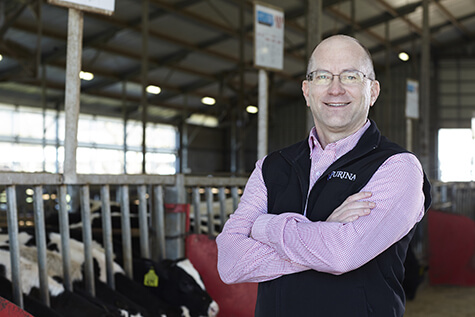
Keep Transition Cows Healthy
Cow : Transition Cow Nutrition
For a cow to achieve optimal peak milk production, her body must operate at optimum efficiency. However, the stress of the transition period in dairy cows can make it challenging to reach this goal.
Researchers are linking more dairy cow health issues during the transition period to a cow’s rumen health, immune strength and oxidative stress caused by an abundance of free radicals.
Explore how transition cow health challenges arise and what you can do about them:
If the rumen and immune system aren’t adequately supported during periods of stress, excessive amounts of free radicals can accumulate. These unstable free radicals can damage other body tissues they contact.
For example, excessive free radicals paired with poor rumen health can alter how important enzymes work, damage the physical structure of cells, and even cause breaks and changes in DNA expression. Free radical damage can weaken a cow’s natural defenses against health challenges as well as challenges to normal body functions.
However, it’s not as simple as adding more antioxidants to the ration. There are several different types of antioxidants, including vitamins, minerals, polyphenols and more. Each plays a unique role in fighting free radicals that challenge rumen health and immune function.
Supplementing more of one specific antioxidant may not necessarily improve cow performance. Work with your nutritionist to supply balanced levels of several types of antioxidants during stressful periods like the transition period. Using a variety of antioxidants can help ensure the cow’s body is in balance and supporting high performance and health.
Purina® NutriTek Technology supports cow health during transition, rumen health and milk production.
Visit with your Purina nutritionist to learn more about supporting transition cow health.
See how Team Purina helps support dairy farmers throughout the U.S.
Researchers are linking more dairy cow health issues during the transition period to a cow’s rumen health, immune strength and oxidative stress caused by an abundance of free radicals.
Explore how transition cow health challenges arise and what you can do about them:
Understanding the domino effect
Dairy profitability starts with a healthy cow, and a healthy cow begins with a healthy rumen. Think of it like a domino effect:- Rumen health helps lower transition cow stress.
- A healthy rumen supports proper immune function, which better supports milk production.
- Lower stress, from both social and physiological perspectives, paves a path for your cows to better support health and productivity.
If the rumen and immune system aren’t adequately supported during periods of stress, excessive amounts of free radicals can accumulate. These unstable free radicals can damage other body tissues they contact.
Recognizing the tipping point
Under normal (non-stress) conditions, the cow’s body has checks in place to successfully manage free radicals. Stressful situations, like the transition period, can overwhelm this balance and contribute to health issues.For example, excessive free radicals paired with poor rumen health can alter how important enzymes work, damage the physical structure of cells, and even cause breaks and changes in DNA expression. Free radical damage can weaken a cow’s natural defenses against health challenges as well as challenges to normal body functions.
Formulating a solution
Studying how antioxidants and other feed additives may counteract free radicals and support rumen health can help nutritionists better formulate dairy rations – rations that help reduce transition cow stress and support peak milk production.However, it’s not as simple as adding more antioxidants to the ration. There are several different types of antioxidants, including vitamins, minerals, polyphenols and more. Each plays a unique role in fighting free radicals that challenge rumen health and immune function.
Supplementing more of one specific antioxidant may not necessarily improve cow performance. Work with your nutritionist to supply balanced levels of several types of antioxidants during stressful periods like the transition period. Using a variety of antioxidants can help ensure the cow’s body is in balance and supporting high performance and health.
Purina® NutriTek Technology supports cow health during transition, rumen health and milk production.
Visit with your Purina nutritionist to learn more about supporting transition cow health.
See how Team Purina helps support dairy farmers throughout the U.S.


